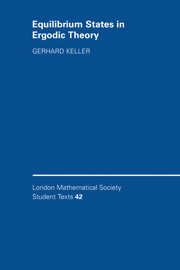A - Appendix
Published online by Cambridge University Press: 05 April 2013
Summary
In this appendix we collect a number of basic facts from analysis, measure theory and probability theory.
Lipschitz-continuous functions
Let (X1,ρ1), (X2, ρ2) be metric spaces. A function f: X1 → X2 is Lipschitz-continuous with Lipschitz constant L > 0, if ρ2(f(x), f(y)) ≤ L · ρ1(x, y) for all x, y ∈ X1. More generally, f is Hölder-continuous, if there are constants a > 0 and H > 0 such that ρ2(f(x), f(y)) ≤ H · ρ1(x, y)a for all x,y ∈ X1.
Let (X, ρ) be a compact metric space and denote by C(X) and Lip(X) the sets of all continuous and all Lipschitz-continuous functions f : X → ℝ, respectively. Then Lip(X) is a dense subset of C(X) with respect to the sup-norm on C(X). An elementary proof of this fact is a good exercise in metric spaces, but the denseness follows also from the Stone-Weierstrass approximation theorem [16, Theorem IV.6.16].
The denseness of Lip(X) in C(X) is complemented by the compactness of the set {f ∈ Lip(X) : f has Lipschitz constant L} in C(X) for any L > 0. As this set is obviously closed in C(X), its compactness is a special case of the theorem of Arzelà and Ascoli, which asserts that each set of uniformly bounded and uniformly continuous real functions on X is relatively compact in C(X) [16, Theorem IV.6.7].
- Type
- Chapter
- Information
- Equilibrium States in Ergodic Theory , pp. 157 - 168Publisher: Cambridge University PressPrint publication year: 1998



